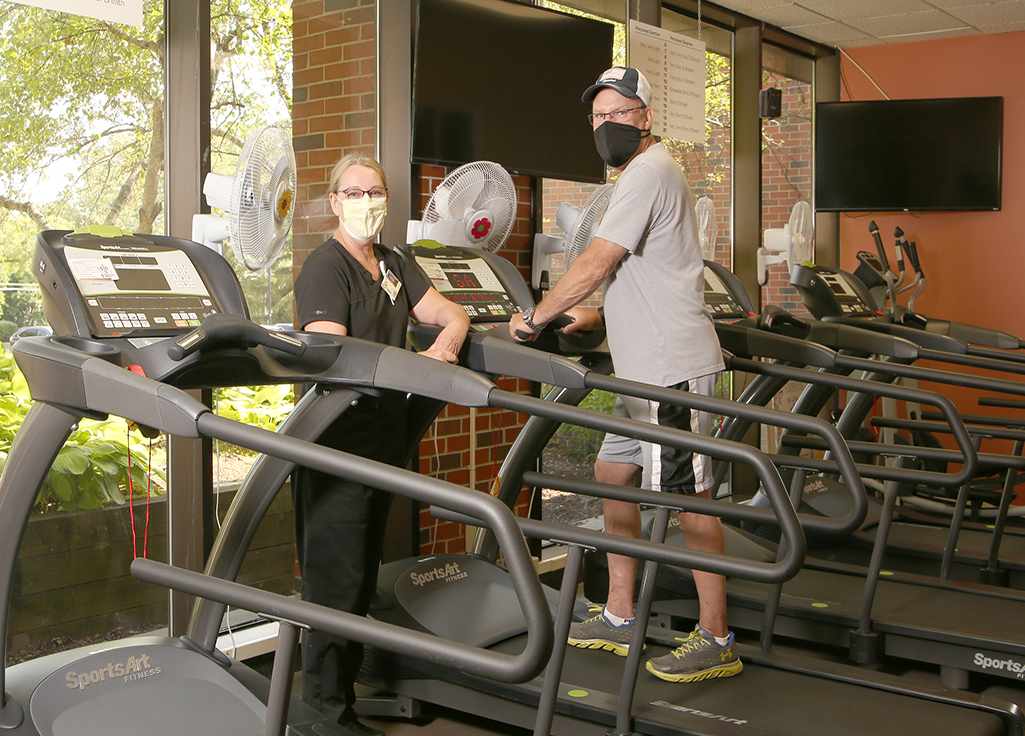

Dan Malin’s work trip to Michigan in January took an unexpected detour – one he would have preferred to avoid. He started to feel ill before departing, and then feared he was having a heart attack while he was driving in Indiana. He rushed to a local hospital and his instincts proved correct. An angiogram showed he had a 99 percent blockage that required a stent to help keep his artery open. After having that procedure in the Hoosier state, Dan’s physicians there also recommended cardiac rehabilitation.
Wanting to find a program close to home, Dan conferred with his primary care provider Lucio Martinez, MD, and cardiologist Madhu R. Malladi, MD, FACC, FASE, both chosen after he moved to Lake Carroll from Bartlett, Ill. They strongly suggested he attend FHN’s cardiac rehab program. According to Dan, “It was one of the best things I ever did.”
“FHN’s cardiac rehab was absolutely fantastic,” he exclaims, “and I have the utmost respect for rehab nurse LeAnne Raders and their entire team. The staff knows their stuff and does a great job creating a positive environment. They were welcoming, inviting, and encouraging to our entire class of participants and gave each patient lots of individual attention. We exercised on the treadmill, did stretching and chair yoga, practiced meditation, and learned about nutrition, all under their careful monitoring.”
Dan was particularly impressed with the team’s emphasis on the psychological aspects of recovering from a heart attack. He says, “At age 54, I was in pretty good shape until recently, but my family history has the cards stacked against me. This incident really shook my confidence. LeAnne, my case manager, along with Molly, the exercise physiologist, and Krista, a cardiac nurse, all helped me understand my limitations while encouraging me to push myself – just not too much. They tailored a program specific to my needs that included gradually increasing my workout. I exceeded my goals and actually ‘graduated’ five weeks early.”
Statistics show that heart patients who go through cardiac rehab have better outcomes than those who do not participate, says LeAnne Raders, BSN, RNBC, who is certified in cardiovascular nursing.
“Implementing cardiac rehabilitation in patients with coronary heart disease reduces cardiovascular mortality and hospital re-admission rates,” LeAnne shares. “It also improves exercise tolerance and reduces anxiety, stress, and depression, which are prevalent in patients with heart problems. Our program focuses on small class sizes and giving each patient an individual plan based on their unique circumstances. We end up forming some lasting friendships, too!”
Now Dan is starting to feel like himself again. “I recently did a bunch of yard work on a hot day and it was great. I felt like a whole person for the first time in a while. My wife kept coming to check on me to make sure I was doing OK, but I assured her I felt fine. Without FHN cardiac rehab, I would not have had the confidence to get out there and work so hard. That was the best part of the program: The mental reinforcement backed up by the physical conditioning to help me achieve maximum functionality. Thanks to FHN, my wife and I are looking forward to all the fun activities we moved here to enjoy: Bike rides, kayaking, walking, and fishing.”